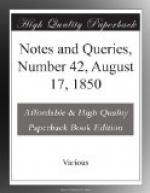T.S.D.
Shooter’s Hill, August 3.
Achilles and the Tortoise.—Your correspondent will find references in the article “Zeno (of Elea)” in the Penny Cyclopaedia. For Gregory St. Vincent’s treatment of the problem, see his Quadratara Circuli, Antwerp, 1647, folio, p. 101., or let it alone. I suspect that the second is the better reference. Zeno’s paradox is best stated, without either Achilles or tortoise, as follows:—No one can go a mile; for he must go over the first half, then over half the remaining half, then over half the remaining quarter; and so on for ever. Many books of logic, and many of algebra, give the answer to those who cannot find it.
M.
* * * * *
REPLIES TO MINOR QUERIES
“Barum” and “Sarum” (Vol. ii., p. 21.)—The formation of the first of these words has not yet been accounted for. I must premise my attempt to supply an explanation by admitting that I was not aware it was in common use as a contraction for Barnstaple. I think it will be found that the contracted form of that name is more usually “Berdest,” “Barnst”. In trying further to contract the word, the two last letters would be omitted, and it would then be “Barn”, with the circumflex showing the omission of several letters. Having reduced it to this state, an illiterate clerk would easily misread the circumflex for the plain stroke “-,” expressing merely the omission of the letter “m”, and, perhaps ignorant of the name intended, think it as well to write at full length “Barum.”
J. Br.
Countess of Desmond (Vol. ii., p. 153.)—It is stated in Turner’s Sacred History, vol. iii. p. 283., that the Countess of Desmond died in 1612, aged 145. This is, I presume, the correct date of her decease, and not 1626 as mentioned by your querist K.; for in Lord Bacon’s History of Life and Death, originally published in 1623, her death is thus alluded to:—
“The Irish, especially the Wild Irish, even at this day, live very long. Certainly they report that within these few years the Countess of Desmond lived to a hundred and forty years of age, and bred teeth three times.”
The manner of her death is recorded by Mr. Crofton Croker, in his agreeable volume of Researches in the South of Ireland, 4to. London, 1824. {187} Speaking of Drumana, on the Blackwater, a little above Youghall, as the “reputed birth-place of the long-lived Countess of Desmond,” he says,—




